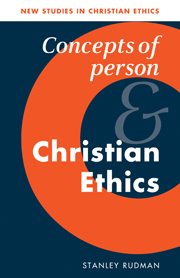Book contents
Introduction
Published online by Cambridge University Press: 02 December 2009
Summary
There is an ancient story which runs as follows. A man was walking along the road when he saw in the distance what he thought was an animal. When he got closer he saw that it was another human being. And when he got closer still he saw that it was another human being. And when he got closer still he saw that it was his brother. How do we view others? Are the distinctions of ‘animal, human being, brother’ ethically relevant? The theme of this book is an exploration of the concept of personhood in relation to a Christian ethic. Not just, ‘who am I?’, but ‘who are we?’, where ‘we’ might include all living creatures. What the concept means, and whether it is as important as it has been claimed to be, are just two of the questions we shall try to answer.
Personhood has occupied a position of importance in ethics since Locke and particularly since Kant. Among contemporary moral philosophers the questions and issues have been refined, but a strongly positive attitude to ethical personhood has been endorsed by writers such as P. Singer, M. Tooley and D. Parfit, although there are equally strong voices of dissent (e.g. R. M. Hare; B. Williams), which regard personhood as too ambiguous to bear such weight. The emphasis in either case has been on rational, moral criteria linked with personhood.
In Christian ethics the position is rather different.
- Type
- Chapter
- Information
- Concepts of Person and Christian Ethics , pp. 1 - 10Publisher: Cambridge University PressPrint publication year: 1997



